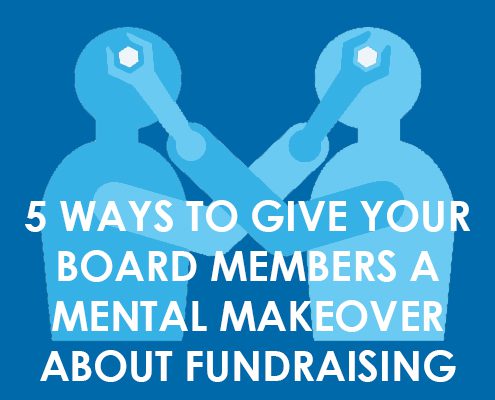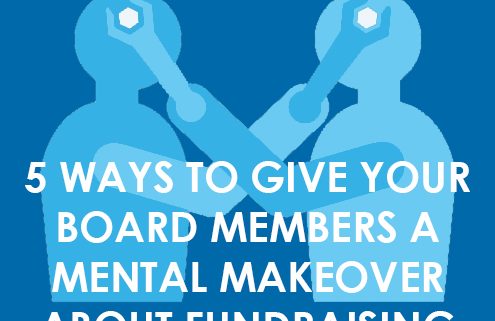5 Ways to Give Board Members a Fundraising Makeover in 2023

Are your board members unsure about fundraising? Do they back off when you want their help?
It’s actually pretty normal. Especially if your board members are not familiar with fundraising – how it works and how to make it successful.
And – on the surface – fundraising may seem weird to many board members. It may seem pushy and invasive.
No wonder they back off. It’s because they have weird ideas about fundraising.
How to Get Board Members to Help In Fundraising
Given that many board members instinctively back off from fundraising, what can we do to get them to help?
Here are some of my favorite tips to give them a mental makeover about fundraising. Let’s lessen their fear and make it easier for them to join in:
1. Take soliciting off the table for them.
There’s (finally) a lot of refreshing, new thinking about board members and fundraising.
We’re acknowledging that maybe their highest and best use is not actually soliciting. Maybe it’s really opening doors to new prospects.
Frankly, I don’t want all board members actively soliciting. Why?
Because these wonderful, well-meaning volunteers are not trained.
They may take things in the wrong direction. They might even blunder up an important donor relationship.
Many times, I’ve had to “clean up” with a major donor after a volunteer somehow offended or was too pushy with them. Have you?
Tip: Back off from soliciting and give them other jobs in the fundraising cycle. Everyone will be happier and you’ll be more successful.
2. Lighten up!
The idea of “fundraising” carries a lot of fear and trepidation with it.
Sometimes even the mention of the “F-Word” is enough to send people running for the door.
So relax. Make it fun for your board members.
If you are relaxed and easy about fundraising, then they will sense it.
If you smile when you talk about fundraising, they will relax and smile back.
If you make it sound easy, they may open up. If you are having fun, then they will be more likely to have fun.
Tip: Give them fundraising jobs that are fun.
3. Educate your board about fundraising.
I find that when board members are educated about how really fundraising works, then they:
- make better decisions
- are more willing to invest resources in fundraising
- start focusing on metrics that matter – like donor retention
- are more supportive of YOUR strategies
- are less likely to push their own fundraising ideas
- are more willing to go along with a PLAN.
What’s more, when you educate them about how major gift fundraising works, then they are much more willing to open doors to their networks.
Why? Because they find out that developing a major donor relationship is a long term process. It’s not ever pushy or confrontational.
Tip: Help board members really understand how fundraising works today.
4. Meet board members where they are.
Acknowledge their hidden fears or frustrations. Try to get them to share their private concerns.
Agree with them, that, yes, there IS a dark side to fundraising.
Where is the dark side? It’s when you are all about the money and not about the person.
Let’s deal with how they really feel.
Don’t operate under the automatic assumption that your board members are “supposed to raise money.”
Because THEY may be operating under an entirely different assumption – that they are there to oversee and forward the mission. Not necessarily to raise money.
It’s really important to be on the same page about expectations and private concerns that might be holding them back from getting involved in fundraising.
Tip: Create openings for board members to share how they really feel about fundraising.
5. Be sure you have a solid fundraising plan that everyone agrees on.
When you have a solid fundraising plan, you have a road map for the year.
You identify all the different fundraising programs and strategies you’ll be tackling. (events, mailing campaigns, donor loyalty program, social media, etc.)
You establish revenue and profit targets and goals from each strategy.
You build out a calendar and a timeline to implement all of this.
You allocate responsibilities for all the different facets of your plan.
And you do NOT attempt more than you can accomplish in excellence. :)
AND – you educate your board members on the plan. THEY just might get to play a role in it.
Tip: Create a plan and get them to buy off on it. You’ll all sleep better at night!
BOTTOM LINE
Board members often DO need a mental makeover.
And if you handle things delicately, you can gradually shift them over.But you do have to acknowledge where they are starting – what they are feeling and help them get over initial fears and concerns.
And start them out with the fun stuff- thanking and entertaining donors. Surely they can learn to enjoy that!
And when board members start engaging with donors, helping to cultivate relationships, serving as cheerful ambassadors, then it’s a WIN-WIN for everyone!



